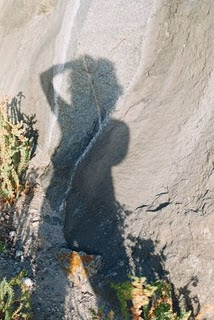In January, according to A WineDark Sea, I spent a week feverishly researching who was responsible for hiring Australian planes to the Japanese whalers to spy on Sea Shepherd's whereabouts, including refuelling the planes at Albany's airport.
The lovely 30 hp Mercury shat itself and Old Salt replaced it with a noisy, smoky, cheap 15 hp two-stroke. This Toa was so unimpressed. Flogging across the harbour into a headwind took on epic proportions. The throttle handle was too short to stand up and drive. Old Salt bought an extension, about a metre long. When we fitted it, I stood up near the bow with a stupid piece of plastic between me and the clunking motor. "They had shorter ones but I thought the longer the better," he told me helpfully. "Doesn't matter how big it is, if it doesn't fucking work then it's no good to me," I said. He replaced the extension with the shorter one.
Had my fortieth birthday party, a guerrilla party at the Tanks. Wicked fun, beautiful friends, guitars, fire, art.
Continued stalking William Hook.
Jumped up and down about the plans to fill in The Cove and dump dredging spoils inside King George Sound by the Albany Port Authority and mining company Grange Resources.
Indigo published two of my stories, in March, I think, Volume 5 anyway. Carmen Lawrence decided she loved 'High Times at the Hotel Desiccation' and people seemed to enjoy that tale of skimpy barmaids, catharting Roebourne cops and alcoholic camels. However, no one has looked at me in quite the same way once they read 'Toxicity' and I discovered that double-edged blade of publishing honest, revealing words. Recently I talked to a Famous Writer and mentioned my Old Salt stories and how they'd morphed out of A WineDark Sea. "Oh yes, I've read your blog," he said. "It's very brave." I wandered off thinking, 'What the hell does brave mean?' Later I was informed that it usually means foolish.
Drank lots of red wine.
Gave up cigarettes for a few months. Got sick of being fat and angry. Started smoking again. Still fat and angry.
Spent two or three days a week during the commercial estuarine season at the salmon shack at Peaceful Bay, netting Irwin's Inlet for whiting, mullet and black bream.
Created a serious discussion on the origins of the term 'No Wuckers'.
Got busted by the most handsome Brad, Super Fisheries Officer Guy, for fishing after dawn on Good Friday, due to a public holiday/weekend confusion. Everything got confiscated, court sessions attended, massive fines imposed, all rather tiresome. This Christmas season, Old Salt asked the department which days he could fish. "Not on Christmas morning," they told him. "It's a public holiday."
"No, it's Christmas Day," said Old Salt. "The public holiday is on Monday."
So Fisheries had to ring Perth and Perth had to ring Canberra and it turned out Old Salt was right. "I want that in writing," he told them. So Old Salt and Sarah Toa got to pull nets and crab pots out of the harbour before dawn on Christmas Day just so Old Salt could live in the hope that someone would ring up and dob him in. Joy to the fucking world and the Goddess of Lost Sleep.
My story 'High Times at the Hotel Desiccation' was selected for the anthology Best Australian Essays 2010. Pretty exciting really when considering the company I was keeping. I got a chance to thank Robert Drewe for selecting the story when I met him at the Sprung Writers Festival.
The next day, I was booked to do a reading with him. Unfortunately hubris kicked in at the Poor Poets Pub Crawl that evening, that red wine guzzling hubris ... danger danger ... I spent about four minutes trying to ride my bicycle home before I realise how bloody dangerous it was.This was precisely the four minutes before I hit the kerb and made quite the butcher's picnic of my face when it connected with bitumen. Yes, I have an unerring nose for self sabotage opportunities. Gotta get on to that one Toa. What is with that? Spent the rest of the year wondering within a comforting condition of denial and an excoriating condition of embarrassment.
Edited the Old Salt stories with Our Sunshine, wrote some more, edited some more, wrote some more, edited some more, wrote some more, edited some more ...
Saw a decades-long crush disappear, flower laden, into the crematorium.
Taught the disaster puppy to be a fisher-dog.
Said Happy 2nd Birthday to A WineDark Sea in September ...
Met some new friends in the blogosphere who live all around the world, including Vencora, Friend, Tom, Nat Hall andTree Shadow Moon.
Okay, I'm gonna wrap up this year now. Lots of other things happened of course but maybe your attention is wandering. I don't blame you!
Thank you for reading A WineDark Sea in 2010.
See you next year.
XXX Sarah Toa



















































